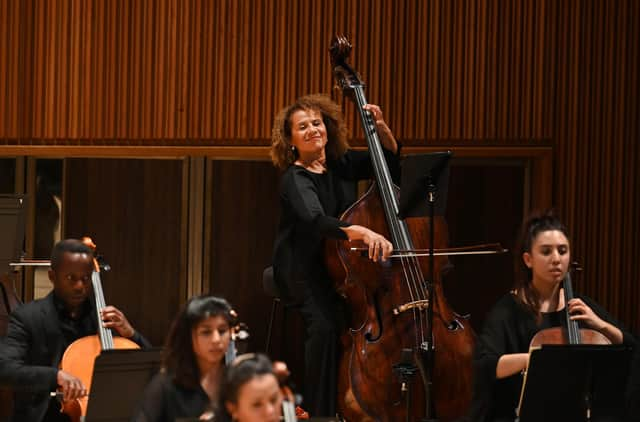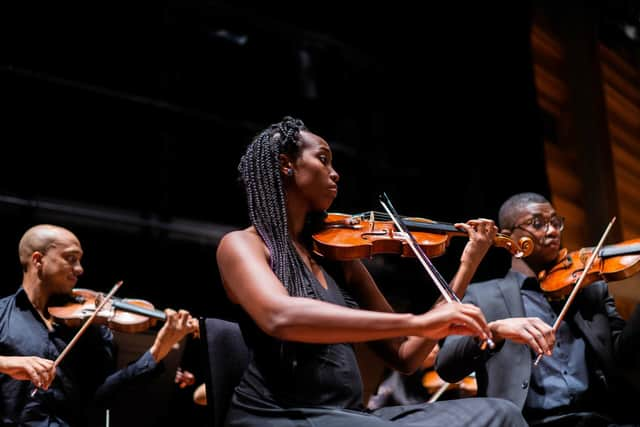Chi-chi Nwanoku 'Every orchestra should reflect the community it serves'


In an ideal world, there should be no need for the Chineke! Orchestra. It’s a point I put to its irrepressible founder and director, Chi-chi Nwanoku, prior to the six-year-old orchestra’s appearance, alongside its associated Chineke! Chamber Ensemble, at this year’s Edinburgh International Festival.
As a British-born double bassist of mixed Nigerian and Irish parentage, and with a successful 35-year career as an international performing artist, radio/TV broadcaster and teacher at the Royal Academy of Music (RAM) behind her, she is not blind to the logic. After all, Chineke!’s raison d’être - a Junior Orchestra was simultaneously established with the launch of the professional orchestra in 2015 - is principally to provide a shoe-in for young black and ethnically diverse classical musicians in the UK and Europe into a white-dominated orchestral profession. If it can fully achieve that, surely its mission is complete.
Advertisement
Hide Ad“It’s one of the things I say to my bass students at the RAM,” she explains. “You’ve got four years of me when I’ll throw everything I know at you. It’s up to you to learn it then run with it. My job is to help you make me redundant.” Expressing the same logic in a conversation regarding Chineke! with Darren Henley, chief executive of Arts Council England, Nwanoku was delighted when he insisted: ‘no Chi-chi, we don’t want Chineke! to not exist; it should be like the LSO and go on forever’.”


And why shouldn’t it? Chineke! made headlines with its successful 2017 BBC Proms debut, and Nwanoku found herself the recipient of an OBE. When the Royal Philharmonic Society added the new Game-Changer category to its prestigious annual awards in 2019, Chineke! was the first winner. It returns to the Proms later this month with Panamanian-American conductor Kalena Bovell and solo pianist Jeneba Kanneh-Mason, but not before joining the line-up at this year’s EIF, where the diversity of its programming again reflects the diversity of its membership.
“I’ve had my eye on Edinburgh since the beginning,” says Nwanoku. “I also made it a commitment when creating Chineke! that every single programme would have music from the great Classical canon, but also include composers of relative ethnicity who had been airbrushed out of the history books.”
True to form, the opening Edinburgh chamber concert on 16 August features Samuel Coleridge-Taylor’s Nonet alongside Vaughan Williams’ Piano Quintet. “The audience will be blown away by this brilliant student piece by a fantastic black British composer,” Nwanoku promises. The following day’s full orchestra concert - directed by Afro-American conductor William Eddins, and with the versatile Scots-based singer Andrea Baker as soloist in Judith Weir’s thought-provoking women.life.song. - includes the premiere of a specially-commissioned instrumental work by the British-born singer/songwriter/composer/cellist Ayanna Witter-Johnson “written as a reflection on Judith’s piece”.
Given Nwanoku’s unquestionable success in her own career, why the need to form Chineke!? It was, she says, a result of her own growing involvement on such governing boards as the National Youth Orchestra of Great Britain and the influential Association of British Orchestras. “Why, I thought, was I the only Black person there, listening to an otherwise all-White board discussing diversity and what’s good for me? Why as a player, when I looked around during concerts did I feel I was the only person of colour, either in the audience or on the platform?"
Enter former culture minister Ed Vaisey, who had already encountered Nwanoku’s concerns. They bumped into each other one evening en route to a Southbank concert by the Kinshasa Symphony Orchestra. “He asked me if I was heading for the pre-concert reception, I told him I hadn’t been invited, so he insisted I come as his guest," she recalls of the coincidence that was to lead to her “light-bulb moment”.
Advertisement
Hide AdWhat Nwanoku encountered at the reception raised her hackles. She was the only black person in attendance. A BBC camera crew, working on a documentary about the visiting African orchestra, was filming an interview with English violinist Tasmin Little. “I popped my bubble. I was the elephant in the room. I hadn’t even been invited. Can you see what happened at that moment, all these white people talking about what’s good for Kinsasha, and not even a black guest at the reception?”
It’s this lack of representation that really bothered Nwanoku. “I feel that every orchestra should reflect the community it serves. I don’t know what the demography in Edinburgh or Glasgow is (it’s currently around 91 per cent and 88 per cent white respectively), but in London 50 per cent identify as Black, Asian or ethnically diverse, similar to Manchester and Birmingham. Orchestras that fail to reflect that are failing their communities.”
Advertisement
Hide AdThis is where it’s important to understand that Chineke! is not exclusive to non-white musicians. Nwanoku doesn’t want it to be the only orchestra where people of colour and ethnicity feel they belong. Nor has she ever wanted it to be a cultural ghetto where white musicians are not welcome. “I want it to have a huge knock-on effect,” she says.
Yet there are still a lot of attitudes to change, and good intentions shouldn’t simply equate to tokenism, she warns. “A lot of orchestras talk to me, saying they’ve been told to diversify. They ask: ‘could you give us two violins, a percussionist and a trumpet player for our next concert?’ I say, hang on a minute. If I just give you my players to make yours look diverse, how are these players going to feel? Everyone will know they’re only there for that purpose. They’re being included, but they’re not going to feel they belong. We want to get into orchestras in the same way everybody else does, on a level playing field through auditions.”
Achieve that and Chineke! will have done its job. Which is not to say it can’t have a musical future way beyond that.
Chineke! Chamber Ensemble is at Old College Quad, 16 August; William Eddins directs the full Chineke! Orchestra at Edinburgh Academy Junior School, 17 August. www.eif.co.uk, www.chineke.org
A message from the Editor:
Thank you for reading this article. We're more reliant on your support than ever as the shift in consumer habits brought about by coronavirus impacts our advertisers.
If you haven't already, please consider supporting our trusted, fact-checked journalism by taking out a digital subscription at https://www.scotsman.com/subscriptions